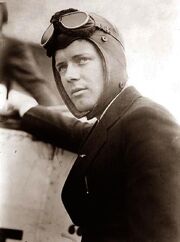No edit summary Tag: sourceedit |
No edit summary Tag: sourceedit |
||
| Line 1: | Line 1: | ||
| + | {{Delete}} |
||
{{Stack begin}}{{Infobox Historical Figure |
{{Stack begin}}{{Infobox Historical Figure |
||
| name= Charles Lindbergh |
| name= Charles Lindbergh |
||
Revision as of 08:44, 25 July 2016
| ||||||||||||||||||||||||||||||||||||||
Charles Augustus Lindbergh (February 4, 1902 - August 26, 1974) was an American celebrity best known as the first man to complete a nonstop transatlantic solo flight. In May of 1927, he flew from New York City to Paris, France.
His celebrated flight, which coincided with the advent of mass media in the United States, made him, along with Babe Ruth, one of America's first modern celebrities. In 1930, Lindbergh further extended his heroism by inventing a pump which revolutionized heart surgery. Fame would carry a heavy price for Lindbergh, however, when, in 1932, his infant son, Charles Lindbergh Jr., was kidnapped, to the outrage and sorrow of the entire nation. Despite extensive nationwide searches, the boy was eventually found to have been murdered. Bruno Hauptmann was convicted and executed for the crime.
Lindbergh's star soon began to tarnish. In the 1930s he traveled to Germany to familiarize himself with the Luftwaffe, initially at the behest of the US War Department; but while in Germany he became chummy with many Nazis, even accepting a German civilian award from Adolf Hitler.
When World War II began, Lindbergh advocated American neutrality, accusing British and Jewish groups of lobbying President Franklin D. Roosevelt (whom this son of a Republican Congressman opposed) with interests other than those of the US at heart. He became prominent in the anti-intervention group America First, using his celebrity to assemble huge crowds at anti-war rallies.
Following the Japanese attack on Pearl Harbor, Lindbergh ceased his anti-war activities and attempted to return to the USAAC. The War Department refused to recommission him on the direct orders of the President. Lindbergh served as a consultant to the Army throughout the war, and, from 1944 on, flew combat missions against the Japanese as a civilian. His suggestions greatly improved the performance of the storied P-38 fighter.
After the war, Lindbergh served as a special consultant to the United States Air Force and Pan-American Airways. In 1954 President Dwight Eisenhower restored Lindbergh to the Air Force as a Brigadier General. From the 1960s on, he advocated for environmental conservation causes. He died in Hawaii in 1974.
Charles Lindbergh in "Before the Beginning"
The kidnapping of Charles Lindbergh's son was a popular video made by the time-viewer.[1]
Charles Lindbergh in Days of Infamy
The Doolittle air raid on the occupied the Hawaiian Islands distracted Joe Crosetti from concentrating on his flight training in a Stearman, so much so that instructor Ralph Goodwin had to speak sharply to get him to pay attention. When Crosetti was coming in for a landing, Goodwin told him the last twenty feet make the difference between him and Charles Lindbergh. Crosetti took offense saying he didn't want to be a Nazi teacher's pet like him but Goodwin soothed him by saying he could be another Doolittle if he paid attention.[2]
Charles Lindbergh in "Someone is Stealing the Great Throne Rooms of the Galaxy"
When Rufus Q Shupilluliumash landed outside Paris en route to nearby Versailles, he compared himself to Charles Lindbergh, only furrier.[3]
References
- ↑ Futureshocks, pg. 89.
- ↑ Days of Infamy , pgs. 297-300, HC.
- ↑ See, e.g., Atlantis and Other Places, pg. 325.
| |||||
| |||||||||||||||||
| ||||||||


